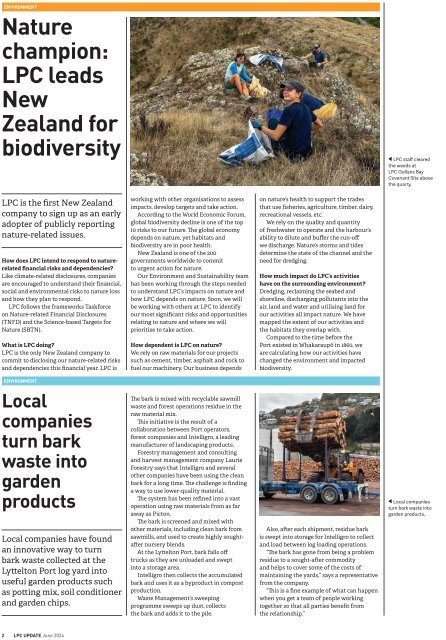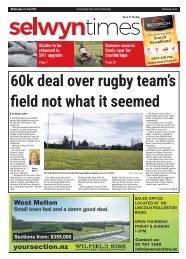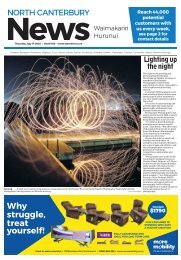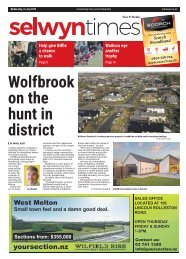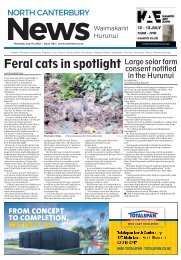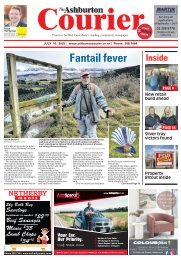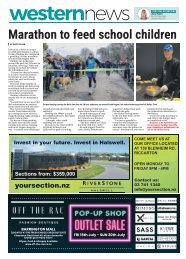Bay Harbour: June 26, 2024
Transform your PDFs into Flipbooks and boost your revenue!
Leverage SEO-optimized Flipbooks, powerful backlinks, and multimedia content to professionally showcase your products and significantly increase your reach.
ENVIRONMENT<br />
Nature<br />
champion:<br />
LPC leads<br />
New<br />
Zealand for<br />
biodiversity<br />
LPC staff cleared<br />
the weeds at<br />
LPC Gollans <strong>Bay</strong><br />
Covenant Site above<br />
the quarry.<br />
LPC is the first New Zealand<br />
company to sign up as an early<br />
adopter of publicly reporting<br />
nature-related issues.<br />
How does LPC intend to respond to naturerelated<br />
financial risks and dependencies?<br />
Like climate-related disclosures, companies<br />
are encouraged to understand their financial,<br />
social and environmental risks to nature loss<br />
and how they plan to respond.<br />
LPC follows the frameworks Taskforce<br />
on Nature-related Financial Disclosures<br />
(TNFD) and the Science-based Targets for<br />
Nature (SBTN).<br />
What is LPC doing?<br />
LPC is the only New Zealand company to<br />
commit to disclosing our nature-related risks<br />
and dependencies this financial year. LPC is<br />
working with other organisations to assess<br />
impacts, develop targets and take action.<br />
According to the World Economic Forum,<br />
global biodiversity decline is one of the top<br />
10 risks to our future. The global economy<br />
depends on nature, yet habitats and<br />
biodiversity are in poor health.<br />
New Zealand is one of the 200<br />
governments worldwide to commit<br />
to urgent action for nature.<br />
Our Environment and Sustainability team<br />
has been working through the steps needed<br />
to understand LPC’s impacts on nature and<br />
how LPC depends on nature. Soon, we will<br />
be working with others at LPC to identify<br />
our most significant risks and opportunities<br />
relating to nature and where we will<br />
prioritise to take action.<br />
How dependent is LPC on nature?<br />
We rely on raw materials for our projects<br />
such as cement, timber, asphalt and rock to<br />
fuel our machinery. Our business depends<br />
on nature’s health to support the trades<br />
that use fisheries, agriculture, timber, dairy,<br />
recreational vessels, etc.<br />
We rely on the quality and quantity<br />
of freshwater to operate and the harbour’s<br />
ability to dilute and buffer the run-off<br />
we discharge. Nature’s storms and tides<br />
determine the state of the channel and the<br />
need for dredging.<br />
How much impact do LPC’s activities<br />
have on the surrounding environment?<br />
Dredging, reclaiming the seabed and<br />
shoreline, discharging pollutants into the<br />
air, land and water and utilising land for<br />
our activities all impact nature. We have<br />
mapped the extent of our activities and<br />
the habitats they overlap with.<br />
Compared to the time before the<br />
Port existed in Whakaraupō in 1860, we<br />
are calculating how our activities have<br />
changed the environment and impacted<br />
biodiversity.<br />
ENVIRONMENT<br />
Local<br />
companies<br />
turn bark<br />
waste into<br />
garden<br />
products<br />
Local companies have found<br />
an innovative way to turn<br />
bark waste collected at the<br />
Lyttelton Port log yard into<br />
useful garden products such<br />
as potting mix, soil conditioner<br />
and garden chips.<br />
The bark is mixed with recyclable sawmill<br />
waste and forest operations residue in the<br />
raw material mix.<br />
This initiative is the result of a<br />
collaboration between Port operators,<br />
forest companies and Intelligro, a leading<br />
manufacturer of landscaping products.<br />
Forestry management and consulting<br />
and harvest management company Laurie<br />
Forestry says that Intelligro and several<br />
other companies have been using the clean<br />
bark for a long time. The challenge is finding<br />
a way to use lower-quality material.<br />
The system has been refined into a vast<br />
operation using raw materials from as far<br />
away as Picton.<br />
The bark is screened and mixed with<br />
other materials, including clean bark from<br />
sawmills, and used to create highly soughtafter<br />
nursery blends.<br />
At the Lyttelton Port, bark falls off<br />
trucks as they are unloaded and swept<br />
into a storage area.<br />
Intelligro then collects the accumulated<br />
bark and uses it as a byproduct in compost<br />
production.<br />
Waste Management’s sweeping<br />
programme sweeps up dust, collects<br />
the bark and adds it to the pile.<br />
Also, after each shipment, residue bark<br />
is swept into storage for Intelligro to collect<br />
and load between log loading operations.<br />
“The bark has gone from being a problem<br />
residue to a sought-after commodity<br />
and helps to cover some of the costs of<br />
maintaining the yards,” says a representative<br />
from the company.<br />
“This is a fine example of what can happen<br />
when you get a team of people working<br />
together so that all parties benefit from<br />
the relationship.”<br />
Local companies<br />
turn bark waste into<br />
garden products.<br />
2 LPC UPDATE <strong>June</strong> <strong>2024</strong>


